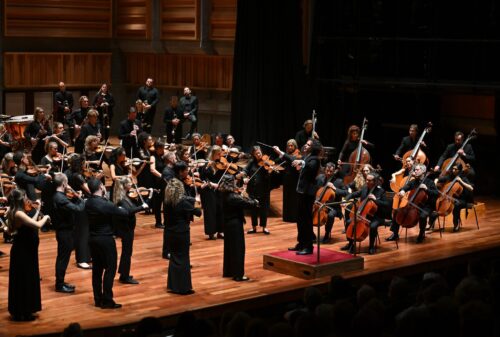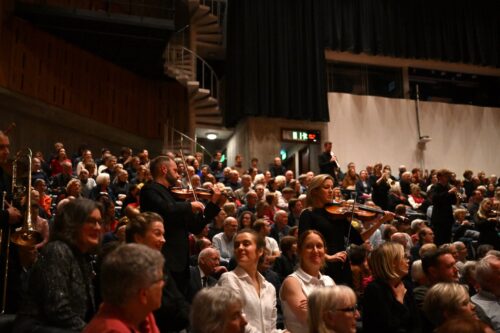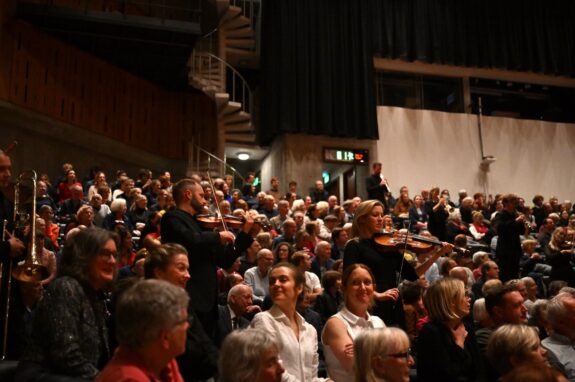 United Kingdom Tarkiainen, Ravel and Stravinsky: Alexandre Tharaud (piano), Tom Service (presenter). Aurora Orchestra / Nicholas Collon (conductor). Queen Elizabeth Hall, London, 23.10.2024. (CSa)
United Kingdom Tarkiainen, Ravel and Stravinsky: Alexandre Tharaud (piano), Tom Service (presenter). Aurora Orchestra / Nicholas Collon (conductor). Queen Elizabeth Hall, London, 23.10.2024. (CSa)

Outi Tarkiainen – The Ring of Fire and Love
Ravel – Piano Concerto in G
Stravinsky – Firebird Suite (1945)
The promise of a little musical colour, warmth and magic is always welcome, particularly on a dull, chill Autumn night on London’s Southbank. The promise was honoured last week, some four days before the clocks went back and eight days before Halloween, by the aptly named Aurora Orchestra under the wand of its founder and principal conductor Nicholas Collon. Their offering – a wonderfully varied programme culminating in a spellbinding rendition ‘by heart’ of Stravinsky’s Firebird Suite (1945).
Established almost 20 years ago, the orchestra accurately claims to be the pioneer for memorised orchestral concerts and the first in the world ‘to break down physical barriers …by removing sheet music and stands for large scale works’ and permitting players to move fluidly on stage and circulate amongst the audience. There are also other important components to their performances: an erudite but accessible verbal introduction to each of the pieces played, coupled with goodhearted audience participation. Those lucky enough to have been present at their Beethoven/Richard Strauss concert earlier this year (review here) or at their semi-dramatised version of Beethoven’s Ninth Symphony at the BBC Proms last August, will know how these innovative musical explorations reach deeper under the skin of the music. The Aurora’s tantalising mission statement strives to create ‘experiences beyond the ordinary’.
The concert began with a bubblingly enthusiastic preview by BBC Radio 3 presenter Tom Service. At this point the players (conventionally seated) launched into a short single movement composition of mysterious beauty by the Finnish composer Outi Tarkiainen, entitled The Ring of Fire and Love. Delicately arranged and incorporating a vivid tapestry of colours, Tarkiainen used the full forces of the orchestra to summon the volcanic eruptions and solar eclipses after which the piece is named. She also intended Ring of Fire as a metaphor to describe in music what a woman feels when, as she gives birth, the baby’s head passes through her pelvis. It is, as she put it ‘the most dangerous moment in the baby’s life’. In a performance of bright clarity and precision, a combination of supple winds, piercing brass, shimmering strings, harp and percussion was skilfully deployed to create an iridescent, almost spectral soundscape, in which passages of turbulence are succeeded by intervals of cosmic tranquillity. The richly textured score occasionally brought Sibelius, Stravinsky and (in the soft trumpet solo) even Miles Davis to mind, but still retained throughout the unique voice of its gifted composer.
The second item on the programme, Maurice Ravel’s Piano Concerto in G, brought us back sharply from the phenomena of the natural world to gritty urban life, specifically to some of the machine powered, technologically driven cities of North America which the composer visited in the late 1920s. It is said that when George Gershwin asked Ravel to give him composition lessons, Ravel asked him how much money he was making from writing music. On being told the astronomical sum, Ravel exclaimed ‘Perhaps I should take lessons from you!’ Although Gershwin’s influence permeates this ‘love letter to jazz’ as Tom Service put it, Ravel was not so much motivated by potential earnings as he was inspired by the skyscrapers of Chicago, and specifically the vast mechanised assembly lines he witnessed at the Ford factory in Detroit.
From the whipcrack first notes of the Allegramente, dextrous pianist Alexandre Tharaud and the Aurora players fused to give a precisely calibrated yet whimsical account of the first movement. Theraud’s keyboard virtuosity was never in doubt. Alternating between astonishingly fast runs and bluesy harmonic progressions, he captured Ravel’s constantly changing shifts of moods and themes in all their syncopated detail. The second movement, an Adagio of serene beauty flowed in an unbroken line of melody, while the third movement – a fast moving, rapid-fire dialogue between piano and orchestra – was executed with awesome speed and panache.

After a twenty-minute break, concertgoers returned to a bare platform to await a deconstructed and reassembled Firebird, played from memory and explained in a light touch but illuminating commentary by a fully miked Collon and Service. Who knew that the fantastical beauty and monstrous nightmares of evil King Kastchei’s enchanted realm as evoked by Stravinsky’s fairy tale ballet score, could be attributed to the composer’s use of harmonic intervals, alternating major and minor thirds and suspenseful tritones? Who would have expected to find parallel connotations of menace and evil in the theme tune for Peppa Pig? And who would have imagined the audience joining the orchestra to sing one of Firebird’s central melodies to the words ‘The monsters are out tonight?’
This educational warmup was not merely entertaining, it was revelatory, and greatly enhanced the standing and scoreless performance, which, when it came, was electrifying. Each section was razor-sharp, and successive soloists were at the top of their game. From the dark and brooding woodwind in the Introduction to the intense, pounding rhythms and dissonant harmonies of the Infernal Dance, the playing blazed and sparkled. In contrasting and gently lyrical movements, such as The Princesses’ Round Dance and the Berceuse, strings and woodwind (particularly a haunting bassoon solo from Amy Harman) effectively combined to create a dreamlike world of peace and contemplation. Meanwhile, the supernatural Firebird swooped and fluttered with mystical beauty, thanks to Jane Mitchell’s agile flute and Rebecca Larsen’s sprightly piccolo. A triumphant finale was rewarded with joyful applause, and to general delight, was reprised once the players had left the platform to scatter and stand among members of the captivated audience. True to its word, the Aurora had worked its magic and even exceeded its promise to make an unconventional Southbank concert an extraordinary experience.
Chris Sallon
